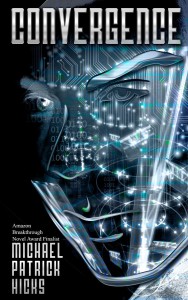What I’m Reading: CONVERGENCE by Michael Patrick Hicks
 Today, we fret about the NSA monitoring our private phone calls or whether Google Glass will infringe on our Fourth Amendment rights, but let's face it, that’s small potatoes. Suppose every image, feeling, thought, burst of hormones, or adrenalin rush of your daily existence was recorded to a chip in your head. Now suppose that chip could be removed and “experienced” by another person. Even your death could be “felt” by another human being.
Today, we fret about the NSA monitoring our private phone calls or whether Google Glass will infringe on our Fourth Amendment rights, but let's face it, that’s small potatoes. Suppose every image, feeling, thought, burst of hormones, or adrenalin rush of your daily existence was recorded to a chip in your head. Now suppose that chip could be removed and “experienced” by another person. Even your death could be “felt” by another human being.
Welcome to the world of Convergence, by Michael Patrick Hicks.
“Dark” doesn’t do justice to the post-apocalyptic Los Angeles where Jonah Everitt exists with his daughter, Mesa. (“Living” is not really the right verb to describe California after the Pacific Rim Coalition invaded the United States.) Built around Jonah, a hitman, memory thief, and addict, is a cast of deeply flawed characters who think nothing of leaving their partners twisting in the wind.
Hicks writes with a visceral flair. Take this moment when Jonah relives a man’s death by downloading his memory chip:
I hit play. A grotesque electrical charge jolted through me, sparking neurons in my brain. A white light blasted through my cerebral cortex and optic nerves. Everything went blindingly bright for moments buried atop moments. An eternity of moments. This is how death feels. Invigorating.
He also plunges deep into the tech of his fictional world. DRMR is Databiological Receiver of Mnemonic Responses, basically a device that digitizes and stores the entire cerebral response to any stimulus. Like GPS, the Internet, or a host of other consumer products, DRMR started as a DARPA project that turned commercial until entire generations were growing up “cybernetically enhanced…in a constant state of connection.”
And that connected ubiquity leads us to the theory of convergence. If everyone is recording every event, every stimuli, every response, and you have a way to overlay all of those recordings, anything can be recreated. From this practice, a new breed of voyeur/librarian emerges, a memorialist, one who searches for answers in a tsunami of data by experiencing the combined memory streams from people–dead or alive.
Like all good sci-fi Hicks roots his plot in the reality of today. One afternoon, I listened to an NPR story about the privacy concerns of police body cameras and realized Convergence was the same problem on steroids. Once an image exists, how do you keep it private? How do you stop someone from posting stolen pictures of naked celebrities all over the internet? Convergence just takes that next step: how do you stop someone from getting high off other people’s digitized emotions?
You can’t put the genie back in the bottle.
Mind-bending sci-fi. Recommended.
 David Bruns is the creator of the sci-fi series The Dream Guild Chronicles, one half of the Two Navy Guys and a Novel blog series about co-writing a military thriller, and co-author of Weapons of Mass Deception, a story of modern-day nuclear terrorism.
David Bruns is the creator of the sci-fi series The Dream Guild Chronicles, one half of the Two Navy Guys and a Novel blog series about co-writing a military thriller, and co-author of Weapons of Mass Deception, a story of modern-day nuclear terrorism.
